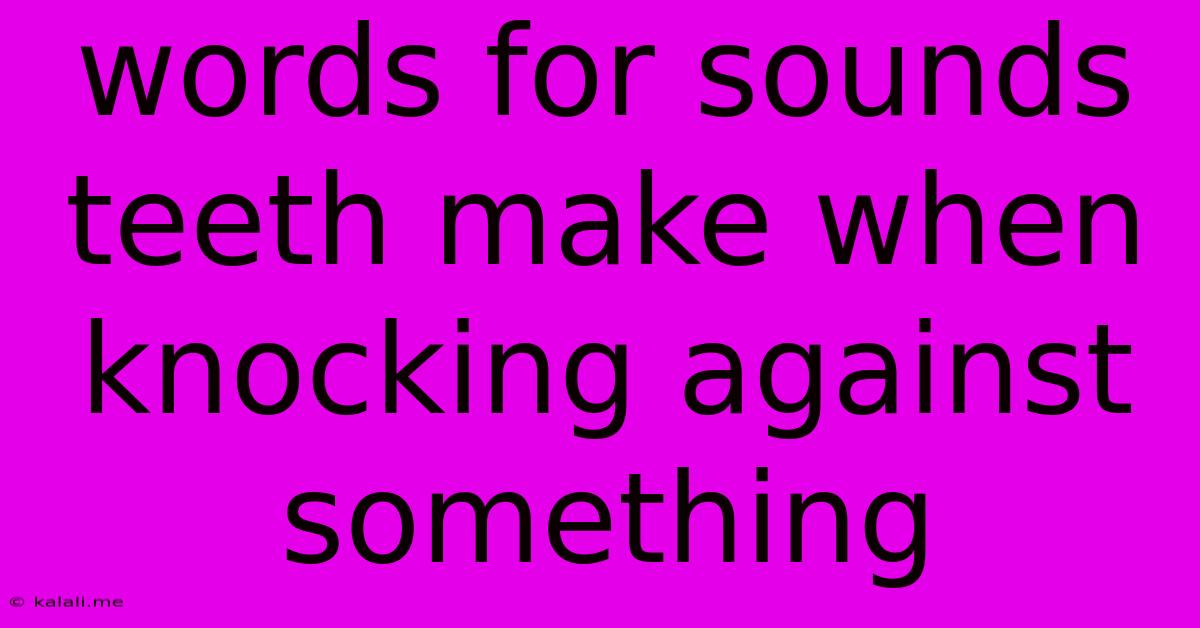Words For Sounds Teeth Make When Knocking Against Something
Kalali
May 23, 2025 · 2 min read

Table of Contents
The Sonic Symphony of Teeth: A Guide to Onomatopoeia for Teeth-on-Object Sounds
Have you ever considered the surprisingly diverse range of sounds your teeth can make when they encounter something hard? From the gentle tap to the jarring clang, the auditory experience is far richer than you might think. This article delves into the fascinating world of onomatopoeia – words that mimic sounds – specifically focusing on the sounds teeth make when they knock against various objects. Understanding these nuances can enrich your writing, making it more vivid and engaging for your readers.
Common Onomatopoeic Words for Teeth Sounds
The most common sound associated with teeth hitting something hard is, of course, "click". This word suggests a short, sharp, and relatively quiet sound. Think of gently tapping your teeth together or lightly bumping them against a hard surface like a spoon.
However, the sound can vary dramatically depending on the force and the surfaces involved. A harder impact might produce a "clack", suggesting a louder, more resonant sound. Imagine forcefully tapping your teeth together or accidentally hitting them against a hard object.
For a more forceful collision, words like "clink" or even "clatter" might be appropriate. "Clink" implies a sharper, metallic sound, perhaps suggesting teeth hitting a metal object. "Clatter," on the other hand, denotes a louder, more chaotic sound, often involving multiple teeth or a more substantial impact.
If the impact is particularly jarring or painful, you might use words like "thwack" or "bang". These words convey a heavier, more intense sound, often associated with a significant impact.
Beyond the Basics: Exploring Nuances in Sound
The choice of onomatopoeia isn't just about volume; it's also about texture and context. Consider these scenarios:
- Gently biting into a crisp apple: A soft "crunch" or "snap" might accurately describe the sound.
- Accidentally biting down on a hard candy: A sharp "crack" or even a painful "shatter" might be more fitting.
- Teeth grinding together: This often produces a grating "grind" or a more rhythmic "screech."
Using descriptive language alongside onomatopoeia further enhances the reader's experience. For instance, instead of simply writing "My teeth hit the spoon," you could write, "My teeth clicked sharply against the cold metal spoon." This adds a layer of sensory detail, making the scene more memorable.
Utilizing Sound in Your Writing
Mastering the art of onomatopoeia related to teeth sounds can significantly elevate your writing. Whether you're crafting a thrilling action scene, a poignant character study, or even a simple descriptive paragraph, choosing the right word can paint a vivid picture in the reader's mind. Remember to consider the intensity, context, and the overall feeling you want to evoke when selecting your words. By carefully selecting these sonic details, you'll breathe life into your narratives and create a truly immersive reading experience.
Latest Posts
Latest Posts
-
Can Matter Be Created Or Destroyed
May 23, 2025
-
How To Get Rid Of Skunk Smell In House
May 23, 2025
-
Throughout Heaven And Earth I Am The Honored One
May 23, 2025
-
Love Of My Life In Spanish
May 23, 2025
-
Where Fig Leaves Came Into Fashion
May 23, 2025
Related Post
Thank you for visiting our website which covers about Words For Sounds Teeth Make When Knocking Against Something . We hope the information provided has been useful to you. Feel free to contact us if you have any questions or need further assistance. See you next time and don't miss to bookmark.